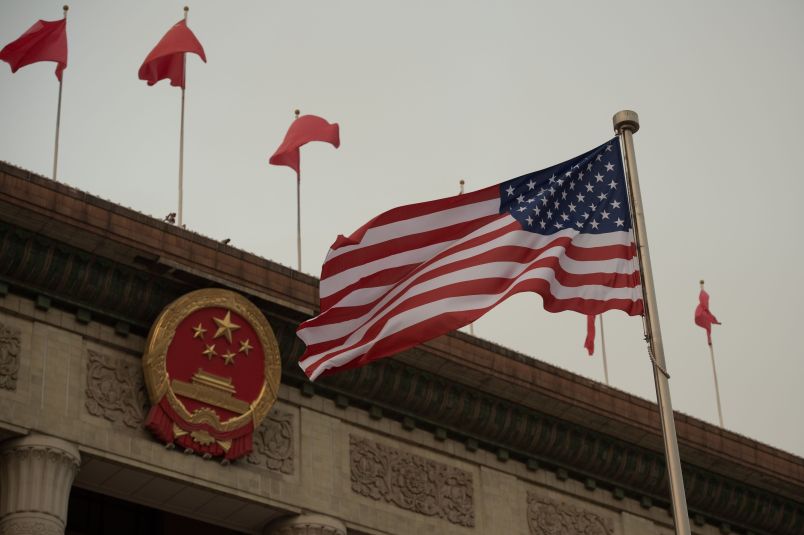WASHINGTON (AP) — Iranian hackers known as “Rocket Kitten” repeatedly target American defense companies in hopes of stealing information to boost Tehran’s missile and space programs. Russian hackers last year compromised dozens of U.S. energy companies. A Chinese cyberespionage group called APT10 relentlessly attacks U.S. engineering, telecom and aerospace industries.
While Moscow’s efforts to meddle in the 2016 U.S. presidential election are widely known, spy services from China, Russia and Iran, along with their proxy hackers also are hard at work trying to steal trade secrets and proprietary information from the United States, according to a government report released Thursday.
“Foreign economic and industrial espionage against the United States continues to represent a significant threat to America’s prosperity, security and competitive advantage,” the National Counterintelligence and Security Center said. “China, Russia and Iran stand out as three of the most capable and active cyber actors tied to economic espionage and the potential theft of U.S. trade secrets and proprietary information.”
Cyberespionage is a relatively low-cost, high-yield way to access and acquire information from U.S. research institutions, universities and corporations, the report said, adding that cloud computing and new technologies, such as artificial intelligence, will expose even more vulnerabilities in U.S. networks,
Cyberoperations are the preferred method for conducting economic espionage, the report said, but U.S. adversaries also acquire sensitive information by hiring sophisticated hackers, recruiting spies or gleaning material from foreign students studying at American universities.
The report listed two dozen technologies that have piqued the interest of foreign intelligence collectors. They include oil, gas and coal-bed methane gas energies; smart grids; solar and wind technologies; biopharmaceuticals and new vaccines and drugs; defensive marine systems and radar; hybrid and electric cars; pollution control; high-end computer numerically controlled machines, which are used to control factory tools and machines in manufacturing; space infrastructure and exploration technology; synthetic rubber; rare earth materials; quantum computing; and next generation broadband wireless communications networks.
China uses joint ventures to try to acquire technical know-how, the report said. It said Beijing seeks partnerships with U.S. government labs to learn about specific technology and information about running such facilities, and uses front companies to hide the hand of the Chinese government and acquire technology under U.S. export controls.
“If this threat is not addressed, it could erode America’s long-term competitive economic advantage,” the report said.
Russia conducts offensive cyberoperations to gather information that can help Moscow make decisions and benefit its economic interests, according to the report. Experts say Russia needs to diversify into technology and other sectors to expand its gross domestic product.
“In support of that goal, Russian intelligence services have conducted sophisticated and large-scale hacking operations to collect sensitive U.S. business and technology information,” the report said. It also said that Russian “military modernization efforts also likely will be a motivating factor for Russia to steal U.S intellectual property.”
Iranian’s operations have typically targeted adversaries in the Middle East, such as Israel and Saudi Arabia. But it also tries to infiltrate U.S. networks to acquire technologies to bolster economic growth, modernize its military and increase exports.
“The loss of sensitive information and technologies not only presents a significant threat to U.S. national security,” the report said. “It also enables Tehran to develop advanced technologies to boost domestic economic growth, modernize its military forces and increase its foreign sales.”







This stuff always goes on. Part of the war of the world.
But under all trumps genius moves, it has been escalated into the red zone.
So much winning, all the way to the losers trophy.
This is nothing new, what we do about it is what matters.
“…Cyberespionage is a relatively low-cost, high-yield way to access and acquire information from U.S. research institutions, universities and corporations…”
Decades before the internet, the Russians were notorious for reverse engineering things they acquired by hook or by crook. Our Jeep, 2.5 ton truck and B-29 are textbook examples. Their first big bomber was a copy of the B29 that landed in Russian territory in an emergency. They would buy copies of patents – legally – from our Patent Ofc, then make the item. For years the only refrigerator you could by in Russia was a copy of the US 1936 Kelvinator.
A lot cheaper that inventing something yourselves.
I remember a story about them capturing a U.S. plane ( maybe that one) that had been repaired, and they copied everything exactly, right down to the repair patch.
I wish I had bet on that cloud crap. When my friends were raving about it I likened it to locking up your valuables in your neighbors house. No longer were you in control. Once you put it out there anyone can get it. The best in the world can’t hack my server. It’s turned off when I’m not using it. I control it.